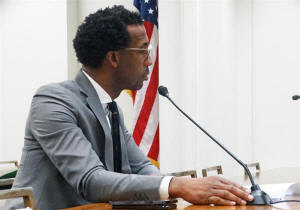House passes bill to bar officials convicted of corruption from holding
public office
 Send a link to a friend
Send a link to a friend
[May 13, 2023]
By PETER HANCOCK
Capitol News Illinois
phancock@capitolnewsillinois.com
 SPRINGFIELD – The Illinois House passed a bill Friday that would bar
anyone convicted of a felony, bribery, perjury or misuse of public funds
while serving as a public official from ever being elected to a state or
local office again. SPRINGFIELD – The Illinois House passed a bill Friday that would bar
anyone convicted of a felony, bribery, perjury or misuse of public funds
while serving as a public official from ever being elected to a state or
local office again.
That measure was introduced as an amendment to House Bill 351 on
Thursday and moved quickly through the House Ethics and Elections
Committee Friday morning with bipartisan support. It then went to the
House floor where it passed 106-0.
Current law bars anyone convicted of a felony from holding a state
office until they’ve completed their sentence. And a provision of the
Illinois Municipal Code bars anyone who has ever been convicted of a
felony from holding an elected municipal office.
But those people are free to run for the General Assembly, governor or
any other constitutional office once they’ve completed their sentence.
“I think it's important to note that Illinois is the only state in the
nation that bars an individual from running for office based on the
office sought, as opposed to the crime committed,” said the bill’s
sponsor, Rep. Curtis Tarver, D-Chicago.
Former Democratic Gov. Rod Blagojevich was barred from running for state
or local office in Illinois after his impeachment in 2009, but the ban
was specific to him.
HB 351 would allow exceptions for people whose convictions have been
reversed, if they are restored the right to run by terms of a pardon, if
they’ve received a restoration of rights by the governor or their rights
are otherwise restored by law.

It also calls for setting up a task force to review current laws and
policies about disqualification standards and make recommendations as to
what criminal conduct should preclude an individual from holding public
office.
[to top of second column]
|

State Rep. Curtis Tarver, D-Chicago,
speaks in committee on a bill that would bar anyone convicted of a
felony, bribery, perjury or misuse of public funds while serving as
a public official from ever being elected to a state or local office
again. (Capitol News Illinois photo by Peter Hancock)

The measure comes less than two weeks after the conclusion of the “ComEd
Four” trial in which four former officials of Commonwealth Edison were
convicted of engaging in a years long scheme to bribe former House
Speaker Michael Madigan. They were convicted of giving lobbying
contracts and no-work jobs to Madigan allies in exchange for favorable
legislation in Springfield.
Madigan himself is scheduled to go on trial starting April 1, 2024, on
racketeering charges related to his dealings with ComEd as well as his
similar alleged dealings with AT&T Illinois, which agreed to pay a $23
million fine in a deferred prosecution agreement in October. Madigan is
also accused of improperly wielding his power as both House speaker and
head of the state’s Democratic Party to enrich himself via his real
estate law firm.
The bill also came during the same week that the Illinois Senate
confirmed Michael P. McCuskey, a retired state and federal court judge,
to a full term as legislative inspector general. McCuskey was appointed
to that post in February 2022 to succeed Carol Pope, who resigned in
July 2021 saying she was frustrated at the General Assembly’s lack of
action on meaningful ethics reform.
In recent days, Republican lawmakers have been harshly critical of
Democrats for not taking swift action on ethics reform following the
ComEd Four convictions. Meanwhile, former Democratic Gov. Pat Quinn, who
succeeded Blagojevich after his impeachment, made a rare appearance in
Springfield to deliver letters to Gov. JB Pritzker and legislative
leaders urging them to call a special session to focus on ethics reform.
Capitol News Illinois is a nonprofit, nonpartisan news
service covering state government. It is distributed to hundreds of
print and broadcast outlets statewide. It is funded primarily by the
Illinois Press Foundation and the Robert R. McCormick Foundation, along
with major contributions from the Illinois Broadcasters Foundation and
Southern Illinois Editorial Association. |